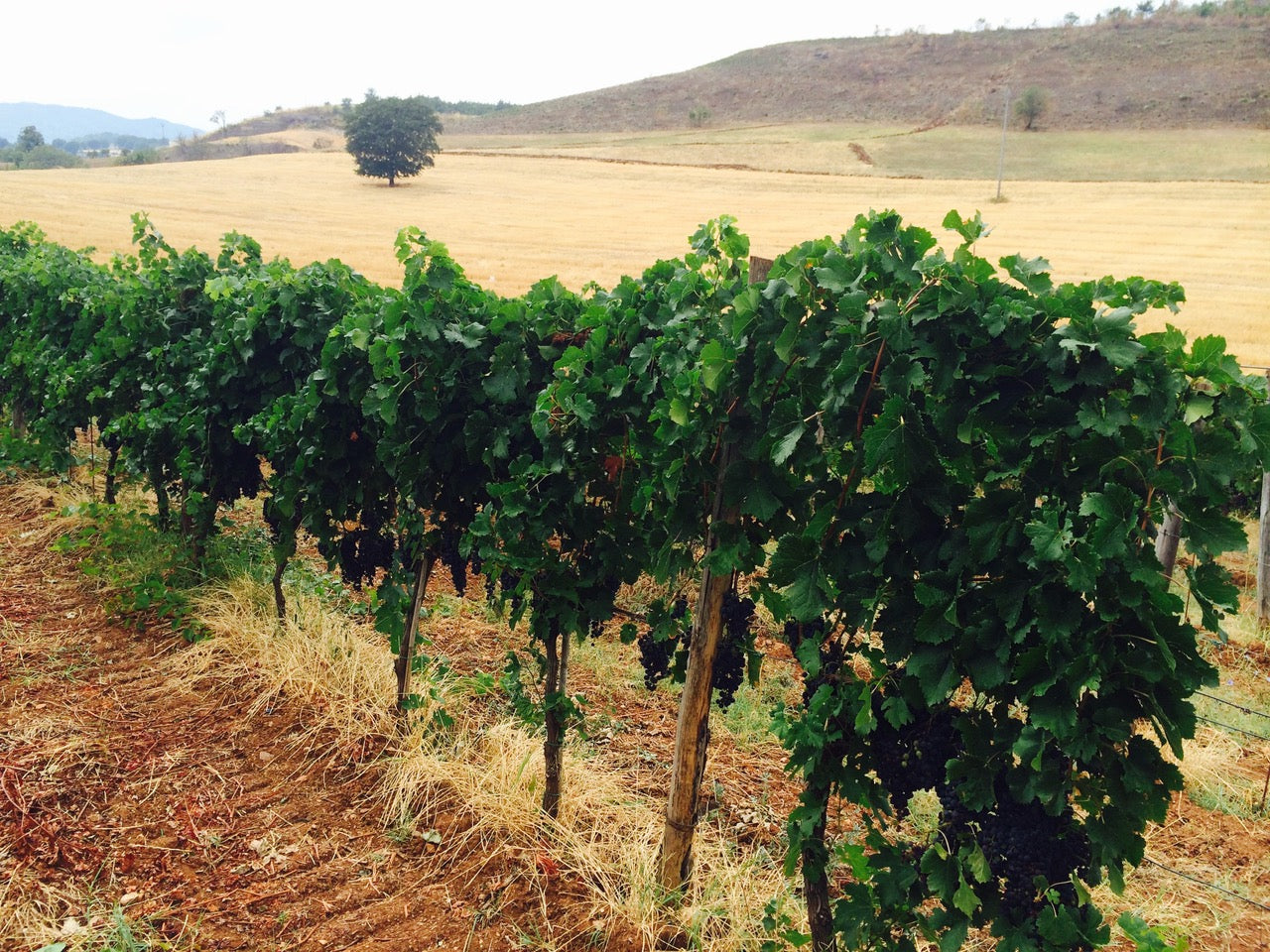Stage #6 (September 2018), led by sommelier Francesco Cannizzaro, is dedicated to NATURAL WINES
Tenute Pacelli - Calabria
Often considered the Cinderella of Italian regions, Calabria actually boasts a highly respectable winemaking tradition. Already in the 7th century BC the Greeks imposed a more advanced viticulture - until then practiced for the production of wine for family consumption - and the region (together with areas of Campania and Basilicata) was subsequently called Enotria. This should be enough to understand Calabria's propensity for viticulture. The arrival of phylloxera, world conflicts and subsequent urbanization caused the sector to collapse, here more than elsewhere. But tradition, history, the attitude of the terroir are not irrelevant factors and in these lands it is easier to reconnect with nature.
The Pacelli family has done just this: they have taken up again the thread of memory , producing wine from the vines planted already in the seventies and adding others, according to the characteristics of the air and the land. Ten hectares, all organic, on a hill that is more than 350 meters above sea level.
The winery's agronomic approach includes great attention to the vineyard and the use of green manure, a practice that regulates the cultivation of certain species of plants that are not harvested but buried, with the aim of enriching the soil with nitrogen and other minerals. Small tricks for local wines, closely linked to history.
Agricola Cirelli - Abruzzo
I met Francesco a few years ago, introduced to me by another producer. It only took a few minutes: we immediately made friends, skipped any conventions and tasted his wines. Francesco is someone who gets straight to the point, he doesn't like lexical or behavioral acrobatics. And his wines are like this, very personal, and it's lucky to be able to drink them with him: it's like going to a
vernissage arm in arm with the artist. Since 2003 Francesco has run the winery in Atri, in the Teramo hinterland, where you can still smell the scent of the sea. It is not easy to become a winemaker, especially in the way he has chosen: organic management, of course, but also a further, very profound respect for nature and time, through the rotation of the crops surrounding the vineyards and natural fertilization. He also puts his own effort into the cellar and has rediscovered
winemaking in amphora , an ancient and organoleptically impactless practice. Step by step Francesco Cirelli passionately designs the wine he wants to produce, committing himself to doing as little as possible, especially in the cellar, when the grapes are already pressed and all that remains is to wait for the miracle of wine to renew itself.
Stefanago Castle - Lombardy
Those who know a little about the world of wine know that Castello di Stefanago is a model. More: a precursor. The brothers Antonio and Giacomo Baruffaldi manage the company in Borgo Priolo, in the Oltrepò Pavese area. An estate of over 130 hectares, of which 22 are vineyards, in the center of which stands the castle tower, testimony to a thousand-year history. They chose organic farming when it was not yet so widespread, when sensitivity to the topic was not as strong as it is today. At Castello di Stefanago the vineyard is an independent ecosystem, it is the sun at the center of the universe: it is observed and cared for with the aim of adapting each intervention to real needs, without ever losing sight of the health of the plants and the vitality of the soil. It is an almost holistic approach, which requires attention to many details and
unconditional respect for nature . I often meet Antonio and Giacomo when traveling to trade fairs: they always have something new to try. After all, they grow Barbera, Pinot Noir, Croatina, Pinot Grigio, Cabernet Sauvignon and Rhenish Riesling:
there is no shortage of grapes, nor even wisdom .
The selected wines
EXPERT BOX
Eos (Pacelli) : the value of this passito is written in the name it bears. Eos is the divinity of Aurora, who at the end of each night runs towards Olympus, announcing the arrival of her brother Helios, the sun. Eos had a son, Memnon, who fell at the hands of Achilles: since then every morning she cries tears that become dew, rare and precious. Like this wine, produced in very few bottles. Made from Trebbiano Toscano and Vermentino grapes, harvested late at the end of November, Eos is a precious gem: it shines with its own light and smells intensely of honey, wisteria, orange blossom and mint. It enchants when tasted, with sweetness and calibrated acidity, well balanced by refined flavour.
It pairs perfectly with ricotta desserts and blue cheeses, but I also recommend it for excellent, solitary meditation.
Trebbiano d'Abruzzo 2017 (Agricola Cirelli), vinified in amphora: the protagonist white grape variety from Abruzzo is undoubtedly Trebbiano. It is a neutral vine, it does not express itself with exuberance and for years it has paid the price of having to be destined for mass consumption. Today this is no longer the case. In his journey as an enlightened winemaker, Francesco intended to do his part to restore Trebbiano to its rightful place among the great regional and national wines. And how? With passion, of course, and with method: he reintroduces winemaking in amphora, the first wine vessel in the history of viticulture. Leave it to nature: no release from the container, therefore, no temperature control, no filtration. You will understand that these are artisanal wines, in the only possible meaning: the one that makes them unique, variable from year to year, according to the actions of nature. This Trebbiano is particularly dynamic: it takes some time to acquire everything it has to say, and it has many things to say. From hints of chamomile and broom it quickly turns to aromas of yellow fruit, and then returns to surprising puffs of sage. The sip is equally vital, powerful and noble. As it should be. It is a wine for a good dinner: excellent with raw fish or steamed scampi, but it also supports more structured dishes without hesitation, such as grilled guinea fowl breast.
Ancestral Blanc de Blanc (Stefanago Castle) : a real surprise. The wine that brought me closer to the Borgo Priolo cellar. In the land of Pinot Noir it was not easy to produce something special but at Castello di Stefanago they succeeded, remaining faithful to their production philosophy. In the Ancestral Classic Method the grapes are harvested when fully ripe: this is the first major difference from the "technological" Classic Method, in which the search for acidity leads to an early harvest. Nature, which completes its course, always rewards and a perfectly ripe grape gives complete olfactory and gustatory sensations. No great reasoning is needed. Fermentation stops with the natural drop in autumn temperatures, and then resumes the following spring. And here is the "prodigy" of the second refermentation, without additions, as nature molds. After manual disgorgement, topping up takes place with the same wine, without the addition of liqueur . A vinification like this can only produce a glass with a perennial and fine perlage , in which the aromas are clear, fruity and intense. The carbonic consistency is never aggressive, on the contrary it is a natural caress, a constant invitation to the next sip. A sparkling wine whose structure and elegance pairs successfully with classic risottos of the Lombard tradition, but also with a nice plate of spaghetti with clams and Pachino tomatoes!
ENTHUSIAST BOX
Barone Bianco (Tenute Pacelli) : I realize that talking about riesling at these latitudes, far from its places of origin or even simple choice, may seem bizarre. In Calabria, you see little, very little of riesling. As soon as you try Barone Bianco everything will return to its place: it will give a thrill - smelling the wine - to perceive the varietal traits of the riesling blending gracefully with those of the
terroir , united by the wise hand of nature, still her. It will be exciting, as it was for me, to let yourself be carried away by the saturated aromas of lava stone and fruit, which lead by hand to the solid and salty sip. Very fine and constant, it is arranged gracefully, with a continuous reference to chalk and apple, until the long, very satisfying epilogue.
Try it with linguine in lobster sauce or with baked monkfish.
Montepulciano d'Abruzzo 2017 (Agricola Cirelli) : Montepulciano d'Abruzzo is a wine with an interesting history. Born in the hills of the Abruzzo hinterland, at the end of the nineteenth century the vine began to be cultivated on the hills and near the sea. It is the beginning of a great rise, both qualitative and quantitative: in the 1950s the first companies decided to bottle Montepulciano were born and subsequently the first cooperative wineries arose. In the eighties there was the definitive boom, thanks to the foresight of a few splendid winemakers who made Montepulciano d'Abruzzo an easy wine to love. And Francesco Cirelli's makes the task even easier: after the first glass you will understand why. Without tricks and without deception, it is a Montepulciano faithful to the terroir , free from bridles, free to express itself as nature wants. Intense and captivating ruby red, it invites the nose with the aromas of red fruit and spices typical of the vine. In the mouth it is concentrated and yet agile, a combination that makes it versatile and suitable for many occasions. This Montepulciano d'Abruzzo brings with it joviality and the characteristics of the vine: in fact, it lends itself to accompanying a wide variety of dishes, from platters of cold cuts and cheeses to grilled meats or stews.
Stefanago Bianco (Castello di Stefanago) : a wine you don't expect. Because it is fresh and drinkable, not at all ordinary, a blend of Rhenish Riesling and Müller Thurgau. Because it marries the characteristics of two very different vines that have found an ideal territory in Oltrepò and makes them harmonious, as if they had always been together. Because simplicity of drinking does not mean conventionality, and Stefanago Bianco proves it. The spirit of Rhenish riesling manifests itself through its characteristic traits: pleasantness imbued with savory minerality and gustatory breadth. The müller thurgau completes the bouquet by bringing floral aromas and amplifies the taste sensations by giving the classic almond hint that prolongs the finish. A successful wedding! It is a wine that goes well with dishes based on both sea and freshwater fish and which, due to its peculiarities, is ideal for late summer aperitifs.




